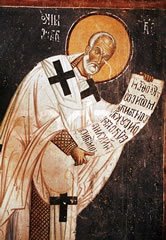Who is Sovereign in Salvation?- Part 5 – Arminianism: Free Will with Partial Depravity

In our last post on this topic we took a look at two analogies (one from Billy Graham and the other from Hank Hanegraaff) that are pressed into service on behalf of the Arminian Free Will with Partial Depravity position. We also considered an excerpt from George Bryson written as part of a Christian Research Journal debate he had with Calvinist James White.
In this post we’ll take a closer look at the two analogies by comparing them to Scripture.
Analogies
- Illustration One: Take and Drink
A man lies terribly ill in a hospital room. Next to him on a table is a medicine that will cure him. All he must do is take the vile, put it to his lips, and drink, and he’ll be made well. - Illustration Two: The Beggar and the King
A beggar sits at the side of the road as the king's procession approaches. When the king draws near, he, the king, extends his hand to the beggar and reveals a precious gift. All the beggar must do to avail himself of the treasure is to reach-out and take hold.
The question is, do the above illustrations truly represent the plight of fallen man? Is it the case that man is simply spiritually impoverished or just very ill? To answer these questions we must consider the extent and the result of the Fall.
Guilt Imputed. Corruption Imparted
In the third chapter of Genesis, we read of our first parents’ sin. Because Adam represented us as our federal head, we all sinned in him (Rom. 5:12–19). The resulting corruption is passed on to us all, and its extent is total—every aspect of our being has been affected:
- Our heart (emotions and affections)—Rom.1:24–27; 1 Tim. 6:10; 2 Tim. 3:4
- Our mind (thoughts and understanding)—Gen. 6:5; 1 Cor. 1:21; Eph. 4:17
- Our will (constitution and moral vitality)—John 8:34; Rom 7:14–24; Eph.2:1–3; 2 Pet. 2:19
Furthermore, Scripture teaches that Adam’s sin brought spiritual death to us all (Gen. 2:16–17, 3:1–7; Rom. 5:12; Eph. 2:1–3; Col. 2:13). As a result, men are spiritually deaf, blind, and completely corrupted (Ecc. 9:3; Jer. 17:9; Rom. 8:7–8; 1 Cor. 2:14); also, men are slaves of sin (John. 8:34; Rom. 6:20; Tit. 3:3) and children of the devil (Eph. 2:1–2; 2 Tim. 2:25–26; 1 John 3:10).
Conclusion
As we have seen, man is not simply ill or spiritually impoverished—he’s dead. Dead men cannot “take and drink” or accept a free gift from a king, not unless they are first made alive. Crassly put, dead men do what dead men do—they rot; they don’t search for God.
as it is written,
"THERE IS NONE RIGHTEOUS, NOT EVEN ONE;
THERE IS NONE WHO UNDERSTANDS,
THERE IS NONE WHO SEEKS FOR GOD;
ALL HAVE TURNED ASIDE, TOGETHER THEY HAVE BECOME USELESS;
THERE IS NONE WHO DOES GOOD,
THERE IS NOT EVEN ONE."
(Rom. 3:10–12)
In the next post in this series we’ll take a look at the Scriptures Mr. Bryson used to support his position to see if they make the case for Free Will with Partial Depravity (i.e., Even though fallen, man can, with God’s help, freely choose Christ) and thus trump the above case made for Total Depravity.















